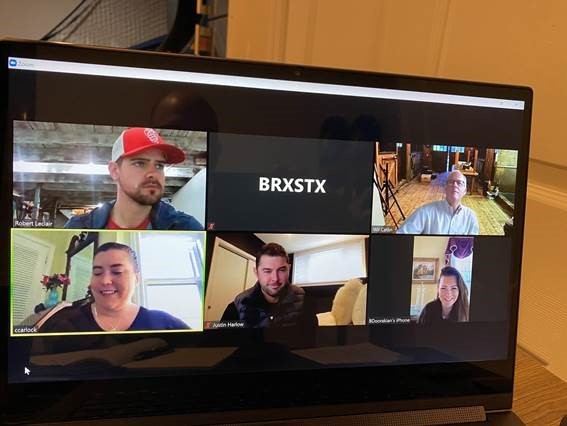By Catherine Carlock – Real Estate Editor, Boston Business Journal | May 1, 2020
On a mid-April webinar to the Commercial Brokers Association in Boston, office broker David Martel gave a sobering statistic: between 90-95% of active real-estate deals are either on hold or dead amid the coronavirus pandemic.
“To say it’s unprecedented is an understatement,” said Martel, an executive managing director with Newmark Knight Frank.
Brokers, attorneys, architects and others throughout Greater Boston’s real estate industry have struggled since the Covid-19 outbreak shuttered businesses, prompted millions of unemployment filings and ground active life to a standstill. While almost all businesses have been affected, for an industry as interpersonal and old-school as commercial real estate — where in-person meetings and boozy cocktail parties are the way deals get done — the shift to remote work has arguably been even more difficult.
The vast majority of deals closing are those that were already far along in the process before coronavirus arrived in the U.S. Here’s a look at three deals — a sale and two lease agreements — that managed to close despite the crisis.
Sale: 300 Baker Ave., Concord
Boston-based Taurus Investment Holdings LLC acquired 300 Baker Ave. in Concord for $74.5 million on April 15. The building is home to the Welch’s Foods Inc. headquarters, Lexia Learning and Emerson Hospital, with another 10 tenants.
Taurus had already done its physical environment due diligence, building tours and tenant interviews. MetLife was lined up to provide debt financing.
“All the things you have to do person-to-person onsite, we’d already done,” said Taurus CEO Peter Merrigan. “We had done deep underwriting on every single tenant in there, and their likelihood of success and challenges they might face.”
In mid-March, the firm had a chance to back away from the deal. Many other companies had already done the same on other transactions, Merrigan said. But after consulting with the seller — a partnership between Novaya Real Estate Ventures and AIG — as well as MetLife, Taurus decided to move forward.
One reason for that decision was that 300 Baker Ave. will be a flagship property for Taurus’ renewable energy subsidiary, RENU Communities. The goal is to retrofit RENU buildings to reduce maintenance and operations costs, as well as to reduce carbon emissions. The focus on renewable and sustainable energy, as well as air quality in offices, will likely be an important consideration as businesses plan a return to the workplace after Covid-19, Merrigan said.
“This was more than just a real estate deal for us. This was an important, one: relationship deal with all the parties involved, two: a strategic investment for our renewable business, and three: we just like the transaction,” Merrigan said.
Newmark Knight Frank’s capital markets and debt and structured finance groups brokered the deal.
Taurus is still looking for other opportunities for deals. It has offices, and people on the ground, across the U.S. and abroad. If something comes up for sale, it’s likely that Taurus employees already know the physical asset, even if they don’t know the nuances of the property.
“It’s not ideal, but it’s totally functional,” Merrigan said. “We can do transactions. Can I do a transaction in a new market? No, I would say not right now. We’re going to stick to our footprint.”
Leases: 271 Cambridge St., East Cambridge; 83 Newbury St., Boston
Brokers from Boston Realty Advisors, including Justin Harlow, Wil Catlin, Bonny Doorakian and Robert LeClair, have closed several deals amid the pandemic, including one office lease to Japanese medical device maker Nihon Kohden from landlord Valor Capital at 271 Cambridge St. in East Cambridge; and an office sublease to Ankyra Therapeutics Inc. from landlord Futterman Organization Inc. at 83 Newbury St. in Boston.
The Newbury Street office was a sublet floor waiting for the landlord’s consent to the deal, Doorakian said. Trouble was, the landlord wasn’t used to doing things virtually.
“It took a little extra time to get something signed,” she said. “The tenant is in the medical research-type industry — the deal was going to happen.”
Catlin represented the sublessor in the deal, who works in Manhattan. Both Ankyra and the Futterman Organization agreed to terms at the end of February, which prompted a 30-day period before the deal could formally close. But getting the signatures took some maneuvering. The landlord wasn’t working in the office, and was unsure how to sign documents electronically.
“I said, ‘I’ll send it to you via DocuSign.’ He said, ‘I’m not sure what that means,’” Catlin said. “I sent a video on how to download DocuSign on his phone, and walked him through the AppleID process.” Eventually, the landlord returned the sublease agreement on March 31, for an April 1 start.
“Everybody’s ecstatic,” Catlin said. “Hats off to the landlord for staying well outside his comfort zone. He doesn’t do stuff like this. He really tried.”
As much as real estate is a face-to-face industry, much of it is now done digitally, both LeClair and Harlow said. Communicating with clients, attorneys, landlords, reviewing financials, discussing space plans — all of that can happen over video chats or phone calls.
And the pandemic hasn’t changed some of the hard deadlines that drive many real estate decisions.
“Lease expiration dates are real dates, and people need to take action even in some of the more difficult circumstances and environment we’re in,” LeClair said.
At 271 Cambridge St., building landlord Valor Capital is repositioning the property to attract new tenants to the market.
“Deals are still happening,” Harlow said. “Other than actually physically walking through the space… there’s no reason why it cannot progress.”
Both Nihon Kohden and Ankyra Therapeutics are in the medical/biotech industry, which helped the deals to close. But other tenants are pressing pause.
But availability of existing real estate — particularly when Boston and Cambridge have halted nonessential construction — is still limited. “We’re already in a really tight market,” Catlin said.



